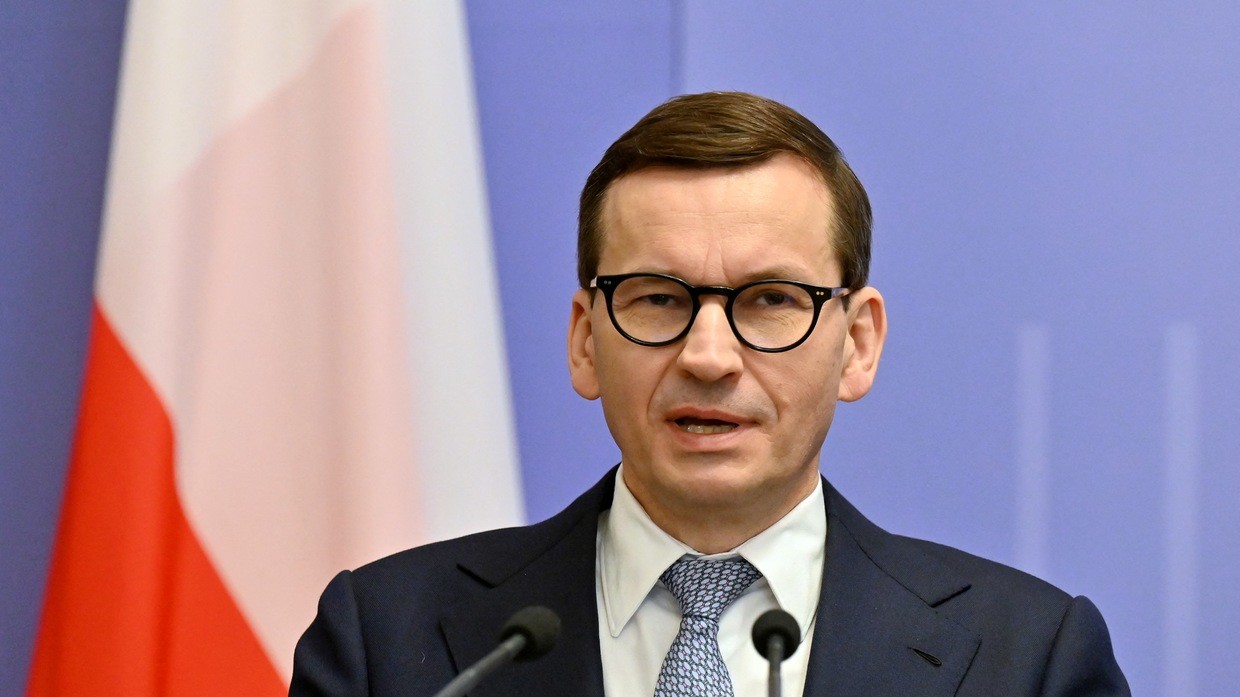Poland has launched a campaign called ‘Stop Russia now!’ to “remind” other European Union members about the situation in Ukraine and convince them to introduce tougher sanctions against Moscow, its Prime Minister Mateusz Morawiecki announced on Saturday. The effort will feature mobile billboards displaying photos from Ukrainian cities that will be sent to various locations.
Morawiecki has also said he would himself travel to EU capitals to remind decision makers “what is happening in Ukraine.” The campaign, which will also include social media posts, according to the prime minister, “has to contribute decisively to ensuring that Europe is not a Europe of indifference, helplessness, that it is not a Europe of defeat,” he has added. Nations in western and southern Europe are willing to return to “normality” too “soon,” Morawiecki has said, adding that the campaign is aimed at “awakening the conscience” of the bloc.
Photos placed on the mobile billboards by the Polish authorities juxtapose the devastation of Ukrainian cities against peaceful life in Europe. Every billboard also has a slogan reading “Stop Russia now!” A separate billboard says that “blood oil fuels Russia’s genocide of Ukraine.”
“Germany, France, Austria, Italy: these countries must do as much as possible to stop the war in Ukraine,” Morawiecki told the media during a press conference at the National Stadium in Warsaw, speaking about his upcoming visit to European capitals and the aims of the campaign.
The prime minister has admitted that sanctions imposed by the EU, US and their allies so far have had little effect on Russia. “Look at the ruble exchange rate; what is happening with the Russian economy. Nothing special is happening there,” he said, adding that restrictions might have some effect, but only in the long run.
Morawiecki then called for “crushing sanctions … much stronger than those that have been imposed.” The move comes as Washington and Brussels are reportedly discussing sanctions designed to hit Russia’s energy sector. So far, Western nations have mostly targeted Russian finances and banking, while the EU has also banned Russia’s coal imports.
While the US introduced a total ban on energy from Russia, which was echoed by Canada, Australia, and Japan, EU member states have been split on the matter. Many European nations largely dependent on Russia’s energy imports opposed an outright immediate ban on Russian oil and gas.
German Economy Minister Robert Habeck warned in March that cutting off such imports immediately could cause “mass unemployment, poverty, people who can’t heat their homes.” Austria admitted on Saturday that it simply cannot afford to ban imports of Russian gas.
Even the US has been cautious about the possibility of an EU-wide oil and gas embargo against Russia, arguing it could drastically increase global oil prices and harm economies in Europe and beyond.
Russia attacked the neighboring state in late February, following Ukraine’s failure to implement the terms of the Minsk agreements, first signed in 2014, and Moscow’s eventual recognition of the Donbass republics of Donetsk and Lugansk. The German- and French-brokered protocols were designed to give the breakaway regions special status within the Ukrainian state.
The Kremlin has since demanded that Ukraine officially declare itself a neutral country that will never join the US-led NATO military bloc. Kiev insists the Russian offensive was completely unprovoked and has denied claims it was planning to retake the two republics by force.

